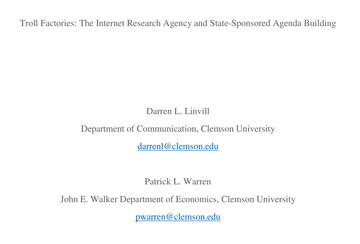
Related contents
State Sponsored TrollingThe cyberspace war: Russian bots and Finnish public debate
Disinformation and ‘fake news’: Interim Report
The pro-Russian disinformation campaign in the Czech Republic and Slovakia
In June 2018, the United States House Intelligence Committee released a list of 3,841 Twitter usernames associated with the activity of Russia's Internet Research Agency (IRA). These were human-operated troll accounts.
The authors collected all tweets published by these accounts between 19 June 2015 and 31 December 2017, cleaned the sample, and analysed the remaining 1,875,029 tweets associated with 1,311 IRA usernames.
They identified five categories of IRA-associated Twitter accounts, each with unique patterns of behaviors:
- Right Troll, spreading nativist and right-leaning populist messages. It supported the candidacy and Presidency of Donald Trump and denigrated the Democratic Party. It often sent divisive messages about mainstream and moderate Republicans.
- Left Troll, sending socially liberal messages and discussing gender, sexual, religious, and -especially- racial identity. Many tweets seemed intentionally divisive, attacking mainstream Democratic politicians, particularly Hillary Clinton, while supporting Bernie Sanders prior to the election.
- News Feed, overwhelmingly presenting themselves as U.S. local news aggregators, linking to legitimate regional news sources and tweeting about issues of local interest.
- Hashtag Gamer, dedicated almost exclusively to playing hashtag games.
- Fearmonger: spreading a hoax about poisoned turkeys near the 2015 Thanksgiving holiday.
The different types of account were used differently and their efforts were conducted systematically, with different allocation when faced with different political circumstances or shifting goals. E.g.: there was a spike of activity by right and left troll accounts before the publication of John Podesta's emails by WikiLeaks. According to the authors, this activity can be characterised as “industrialized political warfare”.
Tags: Russia Fake news and disinformation Social media Data journalism AmericasThe content of this article can be used according to the terms of Creative Commons: Attribution-NonCommercial 4.0 International (CC BY-NC 4.0) . To do so use the the wording "this article was originally published on the Resource Centre on Media Freedom in Europe" including a direct active link to the original article page.

